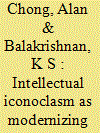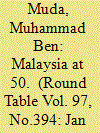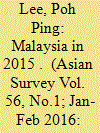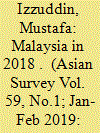|
|
|
Sort Order |
|
|
|
Items / Page
|
|
|
|
|
|
|
| Srl | Item |
| 1 |
ID:
144532


|
|
|
|
|
| Summary/Abstract |
This article attempts to engage in a preliminary twinned study of the foreign policy styles of Mahathir bin Mohamad and Lee Kuan Yew within the framework of ‘modernizing Southeast Asian foreign policies’. Modernization is a process of immense multidimensional displacement in economy, society, political system, attitudes towards politicians, identities, work, and consumption. As such the onus falls upon their leaders to either mitigate change or productively awaken their followers to embrace a new mode of thought. Both Lee and Mahathir have however chosen to engage in the foreign policy of intellectual iconoclasm featuring the narrative of ‘productive shock’, manufactured nationalist logics, elitist policy-making and elaborate self-propaganda.
|
|
|
|
|
|
|
|
|
|
|
|
|
|
|
|
| 2 |
ID:
080701


|
|
|
|
|
| Publication |
2008.
|
| Summary/Abstract |
The Commonwealth has had a central place in Malaya's foreign policy, especially in the period immediately after independence. This was, in part, due to its then current requirement for assistance with its external defence. In addition, there were no regional organizations in Southeast Asia whose purpose and objectives were centrally relevant to Malaysia's experience and national goals. The later emergence of ASEAN, OIC, or other similar bodies, has led to some erosion of Malaysia's profound attachment to the Commonwealth. This is not to suggest that Malaysia has entirely abandoned its support for the Commonwealth's existence. Generally, nowadays it prefers to play a quiet and supporting role in the organization. But Malaysia's leaders believe that the Commonwealth still has a role to play in helping to promote Malaysia's foreign and economic policy objectives, even though it may be relegated to a fourth place in the list of international instrumentalities
|
|
|
|
|
|
|
|
|
|
|
|
|
|
|
|
| 3 |
ID:
145440


|
|
|
|
|
| Summary/Abstract |
The government of Najib Razak in Malaysia came increasingly under siege in 2015 from within his party, the opposition, and many NGOs. Najib managed to survive, but his hold on power is not solid. Meanwhile, Malaysia’s chairmanship of ASEAN was uneventful, relations with U.S. and China remained good, and GDP growth slowed compared with 2014.
|
|
|
|
|
|
|
|
|
|
|
|
|
|
|
|
| 4 |
ID:
164955


|
|
|
|
|
| Summary/Abstract |
After decades of rule by the Barisan Nasional, spearheaded by the United Malays National Organisation, 2018 witnessed a change in government when the Pakatan Harapan opposition secured a stunning victory in the general election. The incumbent prime minister, Najib Razak, was defeated by his political nemesis, Mahathir Mohamad. Malaysia’s economy was stable but sluggish, growing slower than expected in 2018.
|
|
|
|
|
|
|
|
|
|
|
|
|
|
|
|
| 5 |
ID:
115013


|
|
|
|
|
| Publication |
2012.
|
| Summary/Abstract |
This paper argues that Malaysia-Indonesia relations have become increasingly problematic and complex to manage in a post-Mahathir/Suharto era. The unequal pace of the democratization pattern in both countries has largely contributed to this state of affairs. The four key 'transnational' variables or determinants such as migrant labor, mass media, non-governmental organizations and the Anwar factor have significantly impacted on Malaysia's ties with Indonesia against the backdrop of the unequal domestic political changes. These four variables have over the years become more prominent in bilateral relations - often in negative terms. More specifically, they represent the dynamics of the people-to-people dimension in bilateral ties. As such, the deterioration in people-to-people relations threatens to significantly reshape government-to-government diplomacy. Bilateral relations could yet face their severest contradictions when official diplomacy is incapable of reflecting accurately popular sentiments. In effect, the roles of state and non-state actors have been instrumental in influencing recent developments of Malaysia-Indonesia relations.
|
|
|
|
|
|
|
|
|
|
|
|
|
|
|
|
|
|
|
|
|